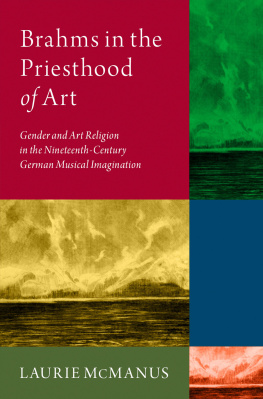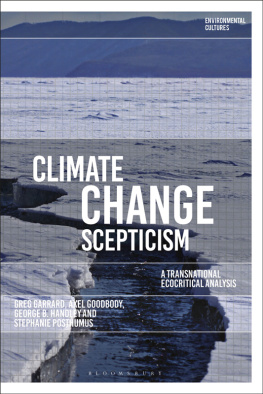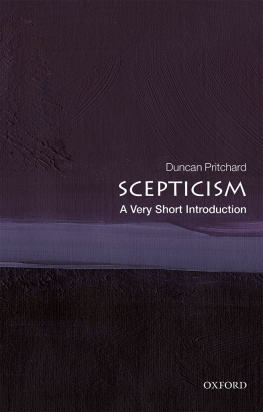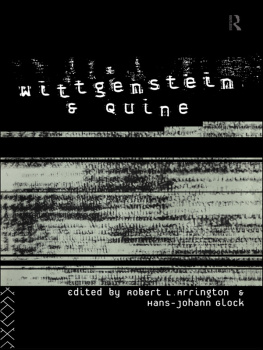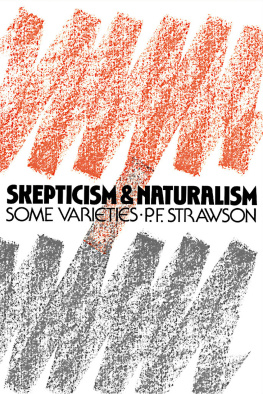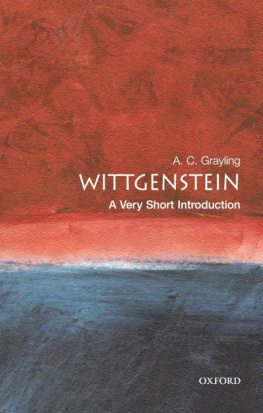McManus - Wittgenstein and Scepticism
Here you can read online McManus - Wittgenstein and Scepticism full text of the book (entire story) in english for free. Download pdf and epub, get meaning, cover and reviews about this ebook. year: 2011, publisher: Taylor & Francis (CAM), genre: Romance novel. Description of the work, (preface) as well as reviews are available. Best literature library LitArk.com created for fans of good reading and offers a wide selection of genres:
Romance novel
Science fiction
Adventure
Detective
Science
History
Home and family
Prose
Art
Politics
Computer
Non-fiction
Religion
Business
Children
Humor
Choose a favorite category and find really read worthwhile books. Enjoy immersion in the world of imagination, feel the emotions of the characters or learn something new for yourself, make an fascinating discovery.
- Book:Wittgenstein and Scepticism
- Author:
- Publisher:Taylor & Francis (CAM)
- Genre:
- Year:2011
- Rating:5 / 5
- Favourites:Add to favourites
- Your mark:
- 100
- 1
- 2
- 3
- 4
- 5
Wittgenstein and Scepticism: summary, description and annotation
We offer to read an annotation, description, summary or preface (depends on what the author of the book "Wittgenstein and Scepticism" wrote himself). If you haven't found the necessary information about the book — write in the comments, we will try to find it.
McManus: author's other books
Who wrote Wittgenstein and Scepticism? Find out the surname, the name of the author of the book and a list of all author's works by series.
Wittgenstein and Scepticism — read online for free the complete book (whole text) full work
Below is the text of the book, divided by pages. System saving the place of the last page read, allows you to conveniently read the book "Wittgenstein and Scepticism" online for free, without having to search again every time where you left off. Put a bookmark, and you can go to the page where you finished reading at any time.
Font size:
Interval:
Bookmark:

Wittgenstein is arguably the greatest philosopher of the last hundred years.Scepticism is one of the central problems that modern philosophy faces.This collection is the first to be devoted to an examination of how that greatphilosopher's work bears on this fundamental philosophical problem.
Wittgenstein's reaction to scepticism is complex, articulating both asense that sceptical problems are ultimately unreal and a sense that scepticismteaches us something about the fundamental character of the humanpredicament.
The essays, specially written for this collection by distinguished philosophersand commentators on Wittgenstein, explore that reaction, addressing,in particular, scepticism about the existence of the external world and ofother minds. In doing so, the book explores issues not only in theory of knowledgebut also in metaphysics, the philosophy of mind, language, perceptionand literature, as well as raising questions about the nature of philosophyitself.
Several of the chapters address the work of Stanley Cavell, perhaps themost influential commentator on the work of Wittgenstein, and Cavellreplies in the final piece to four of those chapters.
This collection is essential reading for students and scholars ofWittgenstein and anyone interested in the debate surrounding scepticism.
Contributors: Akeel Bilgrami, Stanley Cavell, James Conant, IlhamDilman, Jane Heal, Andrea Kern, Marie McGinn, Denis McManus, EdwardMinar, Anthony Palmer, Michael Williams, Crispin Wright.
Denis McManus teaches philosophy at the University of Southampton. Heworks on the philosophy of mind and language, with particular interest in thework of Wittgenstein and Heidegger.

First published 2004
by Routledge
2 Park Square, Milton Park, Abingdon, Oxfordshire OX14 4RN
Simultaneously published in the USA and Canada
by Routledge
29 West 35th Street, New York, NY 10001
Routledge is an imprint of the Taylor & Francis Group
This edition published in the Taylor & Francis e-Library, 2005
To purchase your own copy of this or any of Taylor & Francis or Routledge's collection of thousands of eBooks please go to www.eBookstore.tandf.co.uk.
Selection and editorial matter 2004 Denis McManus; individual chapters, respective contributors
All rights reserved. No part of this book may be reprinted orreproduced or utilised in any form or by any electronic, mechanical,or other means, now known or hereafter invented, includingphotocopying and recording, or in any information storage or retrievalsystem, without permission in writing from the publishers.
British Library Cataloguing in Publication Data
A catalogue record for this book is available from the British Library
Library of Congress Cataloging in Publication Data
Wittgenstein and scepticism/edited by Denis McManus.
p. cm.
Includes bibliographical references.
1. Wittgenstein, Ludwig, 18891951. 2. Skepticism. I. McManus,Denis, 1967
B3376.W564W55546 2004
192dc22
2004001591
ISBN 0-203-46779-5 Master e-book ISBN
ISBN 0-203-77603-8 (Adobe eReader Format)
ISBN 0-415-23291-0 (Print edition)
DEDICATED TO THE MEMORY OF RENFORD BAMBROUGH
Akeel Bilgrami is Johnsonian Professor of Philosophy at ColumbiaUniversity.
Stanley Cavell is Walter M. Cabot Professor of Aesthetics and the GeneralTheory of Value at Harvard University.
James Conant is Professor of Philosophy at the University of Chicago.
Ilham Dilman was Professor of Philosophy at University of Wales, Swansea.
Jane Heal is Professor of Philosophy at Cambridge University, Cambridge.
Andrea Kern is Assistant Professor of Philosophy at the University ofPotsdam.
Marie McGinn is Senior Lecturer in Philosophy at the University of York.
Denis McManus is Lecturer in Philosophy at the University ofSouthampton.
Edward Minar is Associate Professor of Philosophy at the University ofArkansas.
Anthony Palmer is Emeritus Professor of Philosophy at the University ofSouthampton.
Michael Williams is Krieger-Eisenhower Professor of Philosophy at theJohns Hopkins University.
Crispin Wright is Bishop Wardlaw Professor at the University of St Andrewsand a regular Visiting Professor at Columbia University.
The spell that Wittgenstein has cast over philosophy in the relatively shorttime since his death stems, at least partly, from the promise his work holdsout to us of a response to scepticism, the great bug-bear of modern philosophy.Scepticism is the anxiety that we do not know what we think we knowand that, for all we know, the world may be very different from how we takeit to be. For instance, there may be no external world beyond the impressionsthat I take to be delivered by my bodily senses; there may be no other mindsanimating the other seemingly human bodies that I see in motion aroundme; and there may never have been that course of events that I think of asthe past instead I may have emerged into existence only a moment agoreplete with a stock of erroneous memories misleadingly presenting a pastthat never happened. On what basis, the sceptic asks, do we instead believethat there is an external world, populated by other minds, and possessed ofan extended past? His answer is that there is none, that the evidence thatwe have for believing in these fundamental and seemingly obvious truths isquite consistent with bizarre, nightmarish alternatives.
It is to Wittgenstein that many contemporary philosophers have turnedin search of a response to the threat of scepticism. They have turned, in themain, to his discussions in the 1930s and 1940s of meaning, understandingand rule-following (in PG, BB, PI and RFM), his reflections on the possibilityof a private language (in PI, NFL, LSD and NPL), his later writingson philosophy of psychology (RPP 1, RPP 2, LW 1 and LW 2) and the setof notes written shortly before his death and published as On Certainty.Philosophers have seen in this work a rich variety of responses to scepticism.Some commentators have seen certain kinds of sympathy for scepticism inWittgensteins writings. Kripke sees there a new form of scepticism, a meaningscepticism according to which the very meaning of our words vanishesinto thin air (Kripke 1982: 22). Fogelin (1987 and 1994) and Palmer (this volume)have seen Wittgenstein as an inheritor of the perspective of Pyrrhonianscepticism, in expressing a scepticism about philosophy itself. And Cavell(1979) has seen Wittgenstein as helping to expose a truth in scepticism andthe possibility that, in the case of other minds, we may live our scepticism.Nonetheless, Wittgensteins work has typically been mined for a refutationor, more often, a dissolution of scepticism. A refutation would show that thesceptics views are false, that actually we can know that there is an externalworld or can know the minds of others. Such an aim sits uncomfortably withthe recurrent theme in Wittgensteins writings that philosophical problemsare, in some sense, unreal; philosophical problems cannot be solved not, asone might put it, because they are insoluble but because there is no theythere to be solved.
Font size:
Interval:
Bookmark:
Similar books «Wittgenstein and Scepticism»
Look at similar books to Wittgenstein and Scepticism. We have selected literature similar in name and meaning in the hope of providing readers with more options to find new, interesting, not yet read works.
Discussion, reviews of the book Wittgenstein and Scepticism and just readers' own opinions. Leave your comments, write what you think about the work, its meaning or the main characters. Specify what exactly you liked and what you didn't like, and why you think so.








